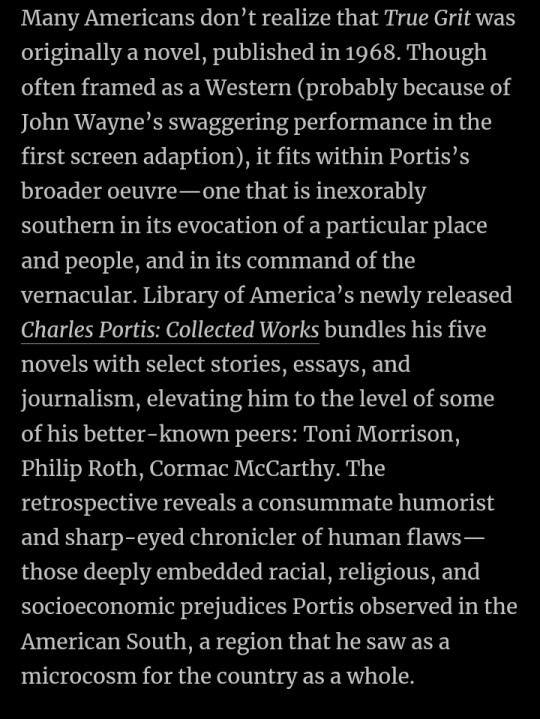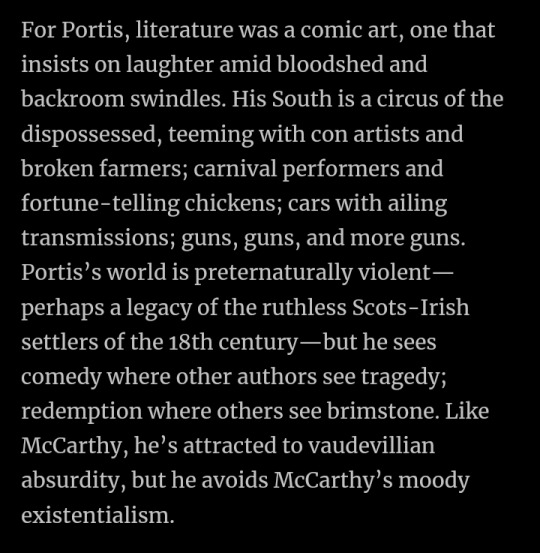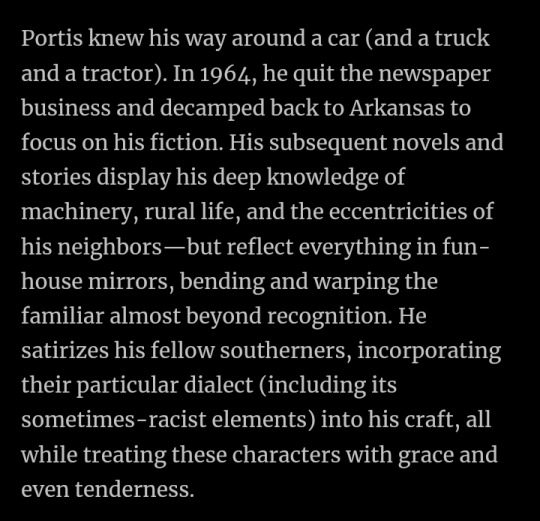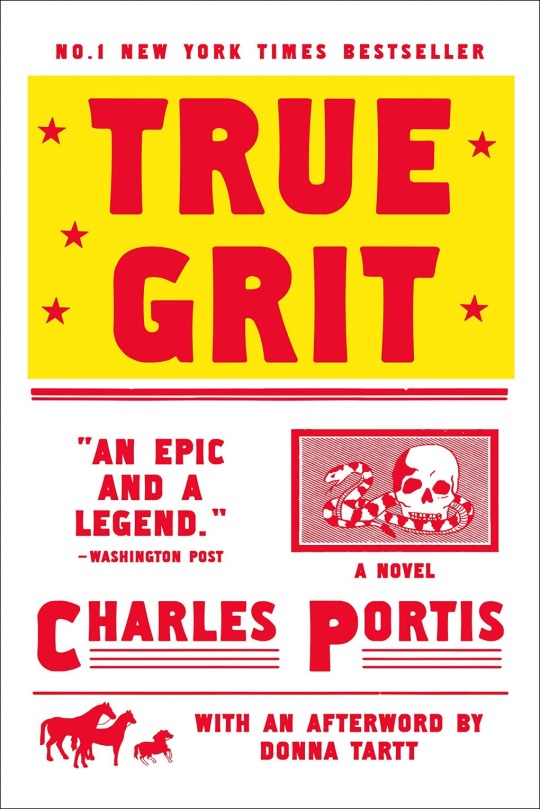#charles portis
Text
yknow when a story has a group of male buddies and the bad guy kills a bunch of them so the survivors go on a vengeful rampage... Where are the wives and girlfriends and mothers and daughters and platonic female besties who are just as willing to pick up a weapon and avenge the men they lost?
this should be more common and i want to call it the "Ross Adler Effect" after Mattie Ross (True Grit) and Sadie Adler (Red Dead Redemption 2): One female character (at least) who takes a second to process how her life has changed before pulling up to the gang like "you don't get to say I can't come too."
I'm tired of media perpetuating the idea that the convictions of a fictional guy's male friends/relatives constantly matter more than those of his female friends/relatives
#harley davidson and the marlboro man was fun and good#but if they had given vanessa williams an uzi#it would have been a much shorter movie#gender#female characters#writing#sadie adler#mattie ross#true grit#red dead redemption 2#rdr2#hailee steinfeld#charles portis#writeblr#dnly rants#og
281 notes
·
View notes
Text
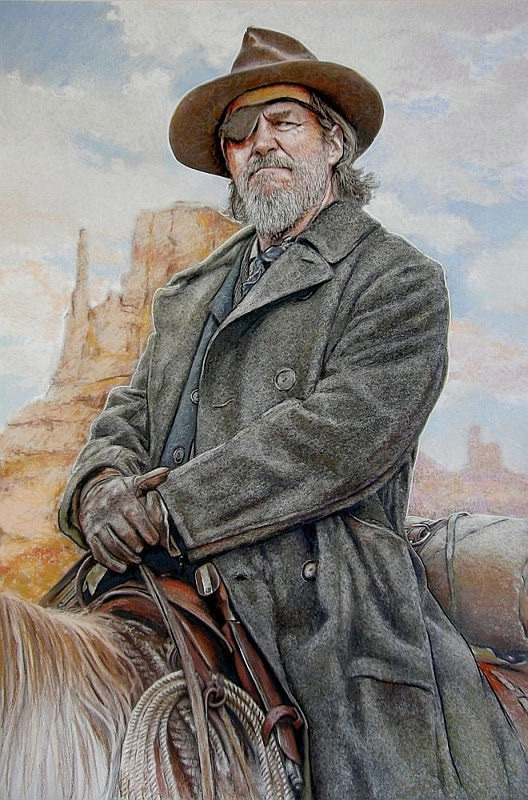
April Fools 📚
“What have you done when you have bested a fool?”
——
Charles Portis, True Grit 📖
#Art 🎨 by Dale Lewis
#true grit#charles portis#western#april fools#jeff bridges#book#books#book quote#book quotations#literature
23 notes
·
View notes
Text
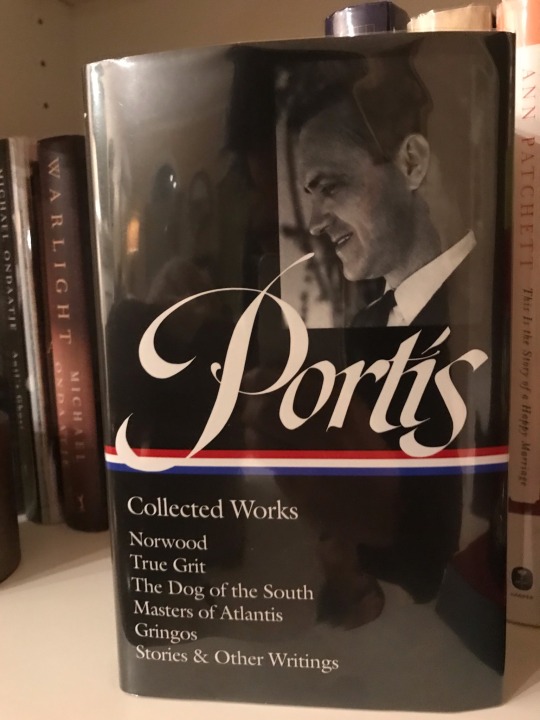
Norwood (1966) by Charles Portis. I savored the gritty, forlorn, Texarkana setting and the marginalized characters. His deadpan delivery (at times reminiscent of Raymond Chandler), ear for colloquial dialogue, and eye for irrelevant detail are brilliant and often hilarious. It will appeal to those with an appreciation for life’s stark realities and absurdities. Loved it.
Excerpts:
He calls the button that enables the seat on a bus to recline, the “Reclino-button”. 😆
“The Remleys had been picking asparagus in the Imperial Valley and were now on their way home with their asparagus money. Traveling with them was their infant son Herschel. Herschel was a cheerful, bright eyed little fellow. He was very well behaved and Norwood remarked on this. Mrs. Remley patted Herschel on his tummy and said, ‘Say I’m not always this nice’. Herschel grinned but said nothing. ‘I believe the cat has got that boy’s tongue,’ said Norwood. ‘Say no he ain’t,’ said Mrs. Remley. ‘Say I can talk plenty when I want to, Mr. Man.’ ‘Tell me how old you are.’ ‘Say I’m two years old.’ ‘Hold up this many fingers,’ said Norwood. ‘He don’t know about that,’ said Mrs. Remley, ‘But he can blow out a match.’ “
Tilmon snickered and shook hands with Norwood. There was a frosty glaze on top of his right sleeve where he had been wiping his nose.
‘Volume is his middle name. Isn’t that right, Tilmon? I say volume is your middle name.’ Tilmon said ‘Tee hee hee.’ His tongue fell out as if to receive a coin.
She was wearing a shiny green party dress with shoulder straps, and some open-toed shoes that were just at the point of exploding with toes. She glowered. She looked formidable.

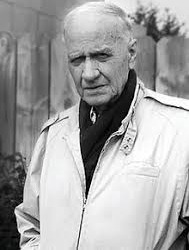
1 note
·
View note
Photo

Photography Inge Morath via a great article in The Atlantic:
“The Novelist Who Truly Understood the South: A new collection of Charles Portis’s work makes the case for his place in the American canon” by Hamilton Cain
5 notes
·
View notes
Text
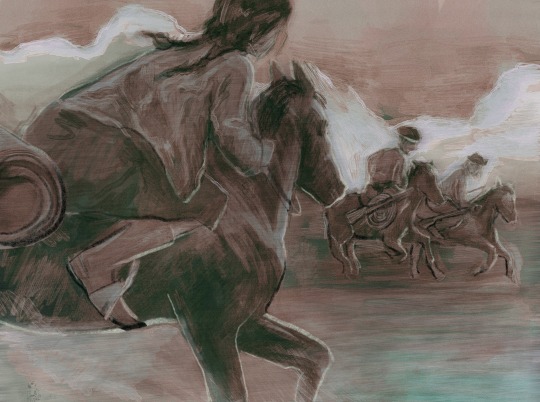
mattie ross
from true grit by charles portis
#true grit#charles portis#mattie ross#hate the colours but ive given up#also gave up on historical accuracy#also gave up on book accuracy#also gave up#enjoy
13 notes
·
View notes
Text




keep forgetting to update my "currently reading" tag so here is an october omnibus. i read norwood by charles portis, golden age by wang xiaobo, a short story collection by sam pink and nevada by imogen binnie
2 notes
·
View notes
Text
"Motel #1" -- Charles Portis
Untitled (Motel Room with Fluorescents), from The Los Alamos-Portfolio,1965-68 by William Eggleston (b. 1939)
“Motel #1”
by
Charles Portis
From his essay “Motel Life, Lower Reaches,” first published in Oxford American in 2003 and later collected in Escape Velocity.
Back when Roger Miller was King of the Road, in the 1960s, he sang of rooms to let (“no phone, no pool, no pets”) for four bits, or…

View On WordPress
5 notes
·
View notes
Text
I remember being, like, nine and some random woman asked me if I ever wanted to get married and I answered: no.
And, of course, this woman told me I'd change my mind and that one day I'd probably really want to. She went into a whole spiel about how marriage was sacred and something, something about every little girl wanting to get married.
And I looked this woman in the eye and told her that Mattie Ross never married, and she did just fine.
Anyway... this woman had never heard of True Grit and had never read the book.
But little nine or ten year-old me had read that book, discovered Mattie Ross, and decided she was me.
33 notes
·
View notes
Photo

Angelica Alzona’s illustration of Charles Portis for Casey Cep’s piece on the new Library of America collection in this week’s New Yorker magazine.
#Angelica Alzona#Great Illustration#Charles Portis#Casey Cep#Library of America#The New Yorker Magazine
3 notes
·
View notes
Text
Time just gets away from us.
True Grit by Charles Portis
3 notes
·
View notes
Text
SO's US Book Tour : Arkansas

True Grit
By Charles Portis
I have never read a Western. I haven’t ever wanted to read a Western. But when flipping through the list of books for Arkansas - I tripped over True Grit and thought, why not, I’m branching out. After struggling to get through The Monkey Wrench Gang, I worried that I was going to find it difficult to get through. Turns out that was not the case! I was pleasantly surprised at the ease in which I got through this one. It is a good story. It’s not my favorite, nor will I probably ever pick up another Western, but I enjoyed it much more than I thought I’d might.
This might be the simplest book I’ve read so far, which is fine. A book doesn’t need to be overly complicated to be enjoyable, and I think it works in the book’s favor to be a straightforward adventure-slash-revenge story.
Written in the late 1960s but set in the 1870s, the narrative is that of an older Mattie Ross recalling about how when she was 14-years-old her father was murdered by a hired hand - Tom Chaney - and how she set about bringing him to justice by hiring a US Marshall by the name of Rooster Cogburn. And that’s really it - the book, like the narrator, is pretty focused on that plot.
Honestly, when I first started reading, I was a little skeptical of a grown man writing from the perspective of a fourteen year old girl. And, admittedly, Mattie Ross doesn’t really sound like a girl her age - 19th century or otherwise. But I think it actually works in the novel’s favor. I really appreciated Mattie’s focused drive and her shrewd observations. She isn’t one to mess around. She isn’t one to get caught up in overly emotional sentimentality. Her world is harsh - but she still tells it like it is. Sometimes, it is to comic effect - having deadpan reflection of rather obscene human nature is pretty funny at times. But the ‘true grit’ the novel’s title refers to is really Mattie - and her unwavering pursuit to bring justice to her father’s murderer.
It’s funny - all through the novel, Mattie tells everyone she meets that her one goal is to take down Tom Chaney for the murder of her father. It becomes a mantra, and becomes strikingly similar to Inigo Montoya from The Princess Bride, who repeats his revenge mantra to anyone he meets. In fact, the characters are similar in design when you bring them down to a base level.
Anyway -- while I doubt it’s that realistic that a fourteen year old during the 1870s would get away with as much as Mattie does, I like her as a character -- much more than I thought I’d might.
The other major character is Rooster Cogburn, a washed out, gritty old US Marshal - who has a lot of baggage carried around from his colorful past. Part of the charm of the novel comes from the unlikely pairing between Cogburn and Mattie, which never really dissolves into a found father/daughter trope, which again, is a nice change of pace. Cogburn, begrudgingly, ends up respecting Mattie in the end, and they bond in the way people on adventure do, but it always is billed as a temporary alliance -- one that Mattie appreciates from the lens of an adult, but never grows beyond the mission they set out to accomplish.
The first half of the book details Mattie searching out Cogburn. I never really thought of Arkansas as being a part of the old west, but the backdrop works really well -- Arkansas being on the edge of the frontier. It kind of reminded me (due to my limited engagement with the time period and location) of those frontier towns you start in at the beginning of the old computer game Oregon Trail - where you get your goods and stuff before setting out across the west to get to the Pacific coast. The second half of the book details going out into ‘Indian Territory’ - the unclaimed wilderness on the Arkansas/Oklahoma border - where, really, there are no laws and anything can happen.
They’re joined by a Texas Ranger named LaBoeuf, who is out to get Chaney for killing a Texas senator. Of course, LaBoeuf and Cogborn don’t get along - and LaBoeuf isn’t really thrilled that Mattie is tagging along to bring Chaney down. But he becomes instrumental in tracking down the gang of thieves Chaney is hanging out with.
Tom Chaney, himself, isn’t really in the novel that much - and to be honest, he’s kind of flatly dumb and villianous. There are much livelier characters even within the gang of ‘bad guys’ that Chaney is hanging around, that the confrontation seems, well, a little anticlimactic if I’m being honest. But the purpose of the novel is less about the destination and more about the journey into the wilderness, and the resolve of Mattie, Cogburn, and LaBoeuf at bringing the outlaw in.
One of the aspects of the novel that I did find fascinating is the detail of the worldbuilding. The novel makes reference to the American Civil War, and to the politics of the 1870s. There are references to how life is different in Arkansas, to Texas, to the East Coast. I don’t know much about Charles Portis - but I have to believe he’s fairly knowledgeable about the time period he’s writing about. Not only is he able to drop these references to the time authentically, the novel itself feels like it was written back in the 19th century. In some ways - it reminds me of all those classic stories we had to read in school that documented and showcased life during a specific era.
I believe this is one of those novels that is considered a modern classic - and I can see why. I liked it well enough for what it was (though I doubt I’ll ever feel like going back to this world) and can understand its popularity - especially to those who enjoy stories set during this time period. While it may not be for everyone, it very clearly is a Western, I’d definitely recommend it - and am glad I picked it up.
6 notes
·
View notes
Text
"...A long, relaxed conversation ensued, which might as well have been taking place in 1890 between me and a veteran of the Civil War, for its utter lack of any reference whatsoever beyond the Reconstruction South..."
"We corresponded after that, and spoke on the telephone — my thought being that if he welcomed annoyance callers so warmly, he might not mind sometimes hearing from me. He was modest about his achievements and uninterested in talking about his life as a novelist or indeed about novels, period; though the diction of his books — effortless as birdsong — pervaded his every spoken sentence, from his conversation one would never suspect that he’d written a novel at all, much less several great ones. His preferred subjects were local history, his boyhood in Arkansas, his time in the military (a postscript to a 2006 letter informs me: “This stamp shows your fellow Virginian and legendary Marine hero Chesty Puller. He was my commanding officer years ago at Camp Lejeune, N.C.”) and above all his life as a newspaperman (somewhat perplexingly to me, he regarded himself mainly as a former newspaperman instead of the major and singular American novelist he was)."
2 notes
·
View notes
Text
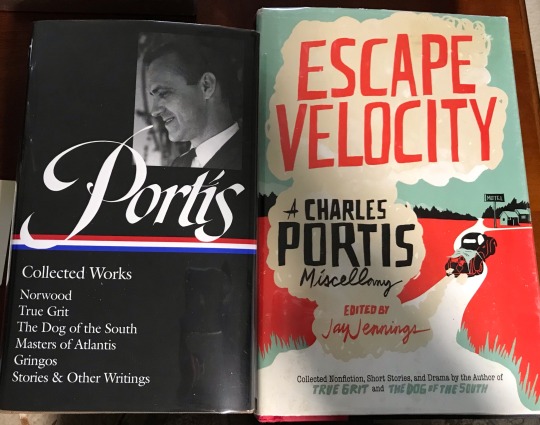
Charles Portis fans will be interested in Escape Velocity. Much of its content is in the Library of America collection. It also includes more journalism pieces, a play called Delray’s New Moon, an interview, and a section of tributes. Jay Jennings is also the editor of the LOA collection.
1 note
·
View note


